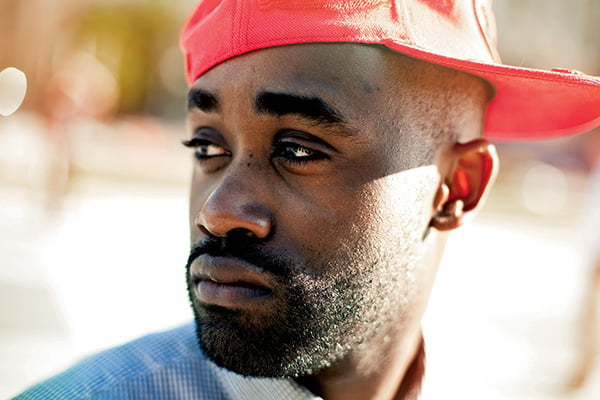Tray Chaney is hesitating—the 28-year-old native of Forestville, Maryland, suddenly seems unwilling to answer a question.
TV audiences may remember Chaney as Poot, the Baltimore street hustler whose grit and guile enabled him to emerge still breathing from five bloody seasons on HBO’s The Wire. Since the show ended its celebrated run in 2008, fans have wondered about the whereabouts of their favorite actors.
I’ve asked if there’s any truth to the rumor that he’s working a maintenance job.
“Maintenance?” he finally says. “Nah. But maybe mailroom.”
Working a 9-to-5 is among the last things fans might expect to find Chaney doing. After being part of The Wire’s ensemble cast, the energetic, charismatic actor felt ready for the next step.
But his phone wasn’t ringing off the hook. He did some cameos as well as parts in direct-to-DVD releases but nothing resembling the exposure he had already achieved.
“I was getting offers,” Chaney says, “but I knew I had to wait for the right offer.”
David Simon, The Wire’s creator, sees Chaney’s struggles as emblematic of the lack of good roles for African-American actors. In 2008, Simon told National Public Radio that “there’s a wonderfully deep reservoir of African-American talent, and they’re not working. Nobody’s writing the parts, and what they are writing is marginal at best.”
This is a reality that Baltimore casting director Pat Moran understands. The Emmy Award winner was responsible for casting 90 percent of The Wire’s talent. She says Oprah Winfrey and Tyler Perry are creating substantive roles for African-Americans, but it’s hard for most projects to get a green light.
Rather than sit and gripe, Chaney tries to makes his own breaks. He promotes his self-published autobiography, The Truth You Can’t beTray, on YouTube—and sells copies out of the trunk of his car. He records rap singles that appear on iTunes.
He pursues his show-business dreams in his spare time, because on most days he’s committed to working in the mailroom at the Howrey law firm in downtown DC.
“The struggle in my life right now is trying to balance Poot from The Wire and Tray Chaney having a 9-to-5 job,” he says.
Since his childhood, Chaney has had high hopes for a career in entertainment. By the time he was eight, his dancing skills had earned him first prize in the famed amateur-night contest at New York’s Apollo Theater.
On The Wire, Chaney’s performance was so convincing that many assumed Simon had pulled him off a tough Prince George’s County street and told him to play himself.
It’s true Chaney grew up surrounded by rough neighborhoods. In 11th grade, after his parents discovered drugs in his car, they sent him to live with an uncle. The adults bet, correctly, that a change of scenery could brighten his future.
By and large, Chaney says, his home life was stable. Poot was simply a testament to his acting ability: “I’d never lie and say I lived a hard life. I’ve always had my real mom, my real dad, a sister, a house, and a dog.”
His parents, Skip and Elaine—he works for FedEx, she’s with Vietnam Veterans of America—stressed the value of honest work. Vowing not to let their son’s successes at the Apollo inflate his ego, they placed his prize money of several thousand dollars in the bank and encouraged him to wait until adulthood to decide if show business was really for him.
By age 18, Chaney knew he was ready to return to the spotlight. His dancing ability landed him professional representation, which he parlayed into a part on The Wire, the first TV show for which he auditioned.
Moran remembers the raw talent that strolled into her casting call in October 2001: “He had a look that could go anywhere.”
Today Chaney lives in Clinton with his wife and two children. He knows that the idea of an actor with a mailroom job may seem odd to some.
“A lot of artists don’t understand that if you’re not working in the entertainment business and you take a 9-to-5 job, that’s not lowering your standards,” Chaney says. “Howrey gave me a chance. They respect me. And my fan base is in that law firm.”
Chaney also sees he’s not alone among former cast members striving for their next break. Those who excelled under Simon’s direction are now relegated to either unchallenging roles—think Jamie Hector (The Wire’s Marlo Stanfield) as an arms dealer in Max Payne—or no roles at all. Baltimore’s Robert F. Chew mastered the subtleties of Prop Joe but hasn’t been seen onscreen since the series ended. DC’s Anwan Glover rocked the role of Slim Charles; he now fronts a go-go band and hosts a local radio show but isn’t acting much. Wire fans tuning in to the April debut of Simon’s latest HBO project, Treme, were likely to wonder where Wendell Pierce (The Wire’s Bunk Moreland) and Clarke Peters (Lester Freamon) had been hiding.
Chaney can draw inspiration from Poot, a character whose practicality ensured his perseverance. Ask him if there’s another Wire-like success on the horizon, and Chaney says he’s certain of it. There’s not even a moment’s hesitation.


















